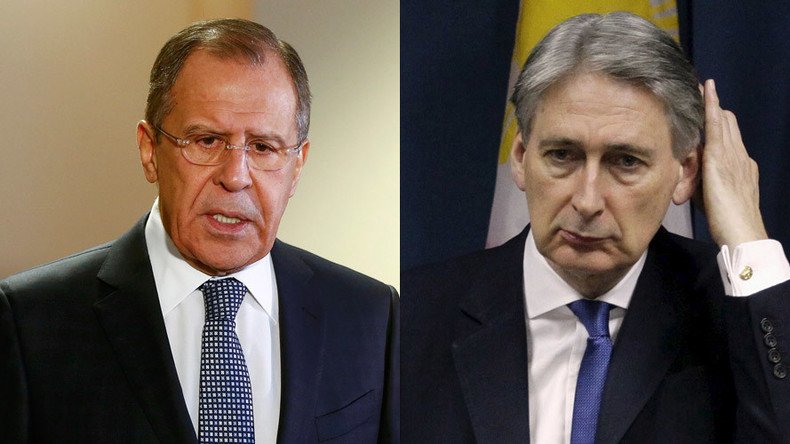Syria peace talks: Hammond courts opposition, Lavrov warns of ‘irrelevant conditions’

British Foreign Secretary Philip Hammond has called on the Syrian opposition to attend UN peace talks in Geneva this week, as Russian Foreign Minister Sergey Lavrov warned the negotiations are threatened by “irrelevant conditions.”
Hammond called on the 32-member opposition body to set aside objections over some of the groups invited to the conference, claiming their absence from negotiations would hand Syrian President Bashar Assad a propaganda coup.
However the foreign secretary’s Russian counterpart has warned the talks are at risk of putting forward “irrelevant conditions” while forgetting the need for collective against terrorism.
The Geneva meetings, described as ‘proximity talks’ by the UN, have set the ambitious goals of securing a ceasefire, organizing opposition to Islamic State (IS, formerly ISIS/ISIL) and broadening humanitarian assistance. They are expected to last six months.
Peace talks between Damascus & opposition to start January 29 - UN Syria envoy https://t.co/2wx9LPQrXEpic.twitter.com/COfwa8jOAU
— RT (@RT_com) January 25, 2016Speaking to the Guardian, Hammond said Syrian opposition groups must engage in talks.
He insisted the negotiations were “going to go ahead and said it was always likely that the UN would be able to arrange indirect proximity talks only at this first stage, rather than direct talks between the Syrian regime and the opposition.
“For the opposition not to attend the talks would hand a propaganda coup to the regime. The opposition must engage in the talks. We need to focus on confidence-building measures, including a ceasefire.”
Russia, US agree to have 2 rebel delegations at Syria peace talks - reports https://t.co/a7kpFejFZbpic.twitter.com/FNyMGMc8F8
— RT (@RT_com) January 24, 2016Turning his attention to Russia’s role in the conflict, Hammond said Moscow must be put to the test about whether it was truly interested in peace and the defeat of IS, as opposed to quashing Assad’s opposition.
He went on to accuse Russian forces of targeting civilians.
“There is no question that is what they are doing and almost certainly in breach of international humanitarian law, and it has to stop,” he said.
Speaking at his annual press conference in Moscow on Tuesday, Lavrov defended Russia’s campaign against terrorists in Syria.
“It has become clear who is fighting the terrorists, who are acting as their accomplices, and who are trying to use them for their unilateral, selfish goals,” he said.
US & Turkey eyeing military op in Syria against #ISIS if peace talks fail https://t.co/7jRypEp90Dpic.twitter.com/WwUPWtblIJ
— RT (@RT_com) January 23, 2016Lavrov warned that attempts by the UN to place conditions on opposition groups joining the fight against terror could hamper the war effort.
“When there are attempts to put conditions for [the] collective fight against terrorism, conditions that are irrelevant, such as ‘if you agree to a regime change, for example, in Syria, then we will for real begin to fight terrorism collectively’... that is, I believe, the biggest mistake,” he said.
The Geneva talks, which start on Friday, have already garnered controversy after UN Syria envoy Staffan de Mistura failed to invite the Kurdish Democratic Union Party (PYD), seemingly under pressure from Turkey.
Opposition groups have complained that the negotiations are in line with Iran’s pro-Damascus policies because there will be no discussion on creating a transitional Syrian government or on Assad’s future role in the country.
Pentagon's ‘boots on the ground’ in Syria is PR stunt - top Russian MP https://t.co/4elG4D2Xo4pic.twitter.com/xz1sYgvXta
— RT (@RT_com) January 25, 2016Burhan Ghalioun, a leading member of the Syrian national coalition, said the meetings would consist of “talks and endless discussions.”
“Clearly, there will be no negotiations between the opposition and the Assad regime to achieve a specific goal, but rather a Syrian forum under the auspices of the UN envoy will convene at the expense of the main issue,” he said.
“Thus, there will be neither accountability nor transition towards democracy, but talks and endless discussions.
“This approach will not only exempt the Assad regime from responsibility for the crisis, but will also present the regime as the only salvation for a community that is fragmented and divided. Likewise, Tehran will appear as a guarantor of Syria’s unity after it was the dynamite that blew it apart,” Ghalioun said.
LISTEN MORE:












